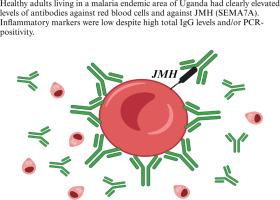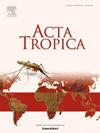An immuno-inflammatory profiling of asymptomatic individuals in a malaria endemic area in Uganda
IF 2.1
3区 医学
Q2 PARASITOLOGY
引用次数: 0
Abstract
Malaria caused by Plasmodium falciparum leads to the destruction of red blood cells (RBCs). A better understanding of how naturally immune individuals control infections should be valuable for future vaccine studies. Antibodies against RBCs and RBC surface antigens were measured together with different inflammatory markers in healthy adults living in a malaria endemic area of Uganda and compared to Swedish healthy adults. Antibodies binding to RBCs were clearly elevated in Ugandans compared to Swedish samples, and for RBC surface antigens the Ugandans had higher levels of antibodies against JMH, but not against Cromer or Kell. Twenty-eight percent of the Ugandans were PCR-positive for P. falciparum, and these had higher levels of IgG against parasite extract and more inhibition in functional growth/invasion assays, but levels of antibodies against RBC, RBC surface antigens, results from Direct Antiglobulin Tests (DAT) and indirect antiglobulin tests were similar when compared with PCR-negative individuals. When inflammatory markers (α-1-antitrypsin, haptoglobin, orosomucoid/α-1-acid glycoprotein, CRP, IgG, IgA and IgM) were measured there were in general almost no signs of inflammation except for clearly elevated levels of IgG. Some had low levels of haptoglobin and for orosomucoid more than half of the individuals had clearly reduced levels. There was no correlation between the inflammatory markers and PCR-positivity, antibodies against RBCs or parasites. In conclusion, for healthy adults living in a malaria endemic area, there was a clear presence of antibodies against RBCs in parallel with high levels of IgG and almost no signs of inflammation, even though many individuals were carrying parasites.

对乌干达疟疾流行地区无症状人群的免疫炎症分析。
由恶性疟原虫引起的疟疾会导致红细胞(RBC)的破坏。更好地了解天然免疫个体如何控制感染对未来的疫苗研究很有价值。研究人员对生活在乌干达疟疾流行地区的健康成年人进行了红细胞抗体和红细胞表面抗原以及不同炎症指标的测定,并与瑞典健康成年人进行了比较。与瑞典样本相比,乌干达人体内与红细胞结合的抗体明显升高;在红细胞表面抗原方面,乌干达人体内针对JMH的抗体水平较高,但针对Cromer或Kell的抗体水平并不高。28%的乌干达人对恶性疟原虫的PCR检测呈阳性,这些人体内针对寄生虫提取物的IgG水平较高,在功能性生长/侵入试验中的抑制作用也更强,但针对红细胞、红细胞表面抗原的抗体水平,以及直接抗球蛋白试验(DAT)和间接抗球蛋白试验的结果与PCR检测阴性的人相似。在测量炎症标记物(α-1-抗胰蛋白酶、隐球蛋白、口服类粘蛋白/α-1-酸糖蛋白、CRP、IgG、IgA 和 IgM)时,除了 IgG 水平明显升高外,一般几乎没有炎症迹象。有些人的血红蛋白水平较低,半数以上的人的类橙皮苷水平明显降低。炎症指标与 PCR 阳性、红细胞抗体或寄生虫抗体之间没有相关性。总之,对于生活在疟疾流行地区的健康成年人来说,尽管许多人身上都有寄生虫,但他们身上明显存在针对红细胞的抗体,同时IgG水平也很高,而且几乎没有炎症迹象。
本文章由计算机程序翻译,如有差异,请以英文原文为准。
求助全文
约1分钟内获得全文
求助全文
来源期刊

Acta tropica
医学-寄生虫学
CiteScore
5.40
自引率
11.10%
发文量
383
审稿时长
37 days
期刊介绍:
Acta Tropica, is an international journal on infectious diseases that covers public health sciences and biomedical research with particular emphasis on topics relevant to human and animal health in the tropics and the subtropics.
 求助内容:
求助内容: 应助结果提醒方式:
应助结果提醒方式:


